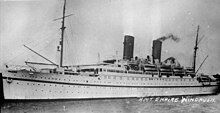MV Empire Windrush

Empire Windrush
|
|
| History | |
|---|---|
|
|
|
| Name: | MV Monte Rosa (1930–1947) |
| Owner: |
|
| Operator: |
|
| Port of registry: | Hamburg (1930–40) |
| Builder: | Blohm & Voss, Hamburg |
| Yard number: | 492 |
| Launched: | 4 December 1930 |
| In service: | 1931 |
| Out of service: | 1945 |
| Identification: | |
| Fate: | Surrendered as a war prize |
|
|
|
| Name: | HMT Empire Windrush |
| Namesake: | River Windrush |
| Owner: |
|
| Operator: | New Zealand Shipping Company |
| Port of registry: | London |
| Acquired: | 1945 |
| In service: | 1946 |
| Out of service: | 30 March 1954 |
| Fate: | Sank after catching fire |
| General characteristics | |
| Tonnage: |
|
| Length: | 500 ft 3 in (152.48 m) |
| Beam: | 65 ft 7 in (19.99 m) |
| Depth: | 37 ft 8 in (11.48 m) |
| Propulsion: | 4 SCSA diesel engines (Blohm & Voss, Hamburg), double reduction geared driving two propellers. |
| Speed: | 14.5 knots (26.9 km/h) |
HMT Empire Windrush, originally MV Monte Rosa, was a passenger liner and cruise ship launched in Germany in 1930. During the 1930s, she operated as a German cruise ship under the name Monte Rosa. During World War II, she was operated by the German navy as a troopship. She was acquired by the United Kingdom as a prize of war at the end of the war and renamed Empire Windrush. In British service, she continued to be used mainly as a troopship until March 1954, when the vessel caught fire and sank in the Mediterranean Sea with the loss of four crew.
Empire Windrush is best remembered today for bringing one of the first large groups of post-war West Indian immigrants to the United Kingdom, carrying 492 passengers and one stowaway on a voyage from Jamaica to London in 1948.British Caribbean people who came to the United Kingdom in the period after World War II are sometimes referred to as the Windrush generation.
Empire Windrush, under the name MV Monte Rosa, was the last of five almost-identical Monte-class passenger ships that were built by Blohm & Voss in Hamburg between 1924 and 1931 for Hamburg Süd (Hamburg South American Steam Shipping Company).
During the 1920s, Hamburg Süd believed there would be a lucrative business in carrying German immigrants to South America and the first two ships were built for that purpose, passenger accommodation was single-class, with space for 1150 in cabins and 1350 in dormitories. In the event, the immigrant trade never materialized and the two ships were re-purposed as cruise ships, operating in Northern European waters, the Mediterranean and around South America.
This proved to be a great success. Until then, cruise holidays had been the preserve of the rich. But by providing modestly-priced cruises, Hamburg Süd were able to profitably cater to a large new clientel. Another ship was commissioned to cater for the demand – the MV Monte Cervantes. However she struck an uncharted rock and sank after only two years in service. Despite this, Hamburg Süd remained confident in the design and quickly ordered two more ships, the MV Monte Pascoal and the MV Monte Rosa;Monte Rosa was launched on 4 December 1930.
...
Wikipedia
